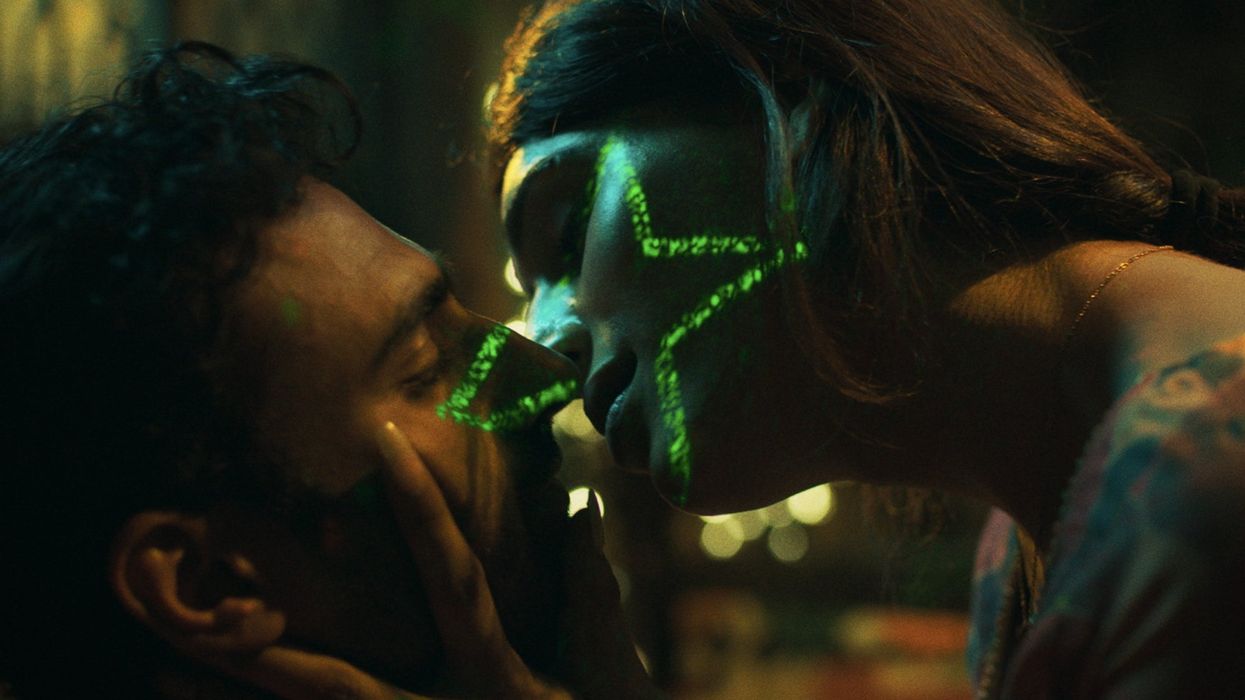(CNN) — Last year, a small independent movie by a debut director premiered at the Cannes Film Festival. Called Joyland, it was notably the first Pakistani feature to screen at the world's most prestigious film festival. The cast walked the red carpet, posed for photographs and received a standing ovation — all routine procedures when launching a film. What happened next was less so.
Joyland, written and directed by Saim Sadiq, is the story of a tragic love triangle between a married couple and a transgender woman in Lahore, Pakistan. The husband, pushed by his conservative, patriarchal family to get a job, becomes a backing dancer at an erotic dance theater and falls in love with the trans woman leading the troupe.
The film, which hits US theaters this week, won a jury prize and the Queer Palme — an award recognizing LGBTQ+ cinema — at Cannes before securing a major distribution deal. But then, as its domestic release approached last November, the film was banned in Pakistan after the country's censorship board received complaints that the movie contained "highly objectional material" that does not conform with the "social values and moral standards of our society." By this point Joyland had already been selected as the country's Oscar submission, creating an awkward dissonance: It was a film deemed worthy of the Oscars, but not domestic audiences.
Trans rights are broadly protected by Pakistani law, and censors' intervention was seen by critics as caving in to a vocal minority decrying the film. Nobel laureate Malala Yousafzai, one of the film's executive producers, interceded with an op-ed in Variety calling the decision "tragic" and pointing out that "most of those lodging complaints have not seen the film."
Four days and a few edits later, the film was cleared for release in all but one province, Punjab, but not before the furor engulfed Joyland, lighting up social media and playing out on national TV.
It was not an easy period, recalled Sadiq. "This is not how anybody wants to get their film put out into the world," he told CNN. "There [was] a very severe sort of trauma that my cast members and I faced in that time period, with a film that we made with so much love and sincerity."
With the film's US release now hotly anticipated, Sadiq has reached equanimity with the fact the controversy put Joyland on more people's radars.
"That honest expression of art being co-opted and turned into such a political thing was, in the beginning, very uncomfortable for us," he continued. "But of course, it did [what] anything that's turned into a political, pop culture moment does: get a lot of eyeballs."
Beyond the ban
Different censorship boards view films differently. The UAE banned Disney's Lightyear last year, and Pakistan had previously banned The Da Vinci Code in 2006. New Zealand banned the original Mad Max for years due to its portrayal of "violence and anti-social behavior" at a time when gang violence was a hot topic. But when one thinks of banned or once-banned movies, it may be the excesses and depravity of Ken Russell's The Devils (1971) or Pasolini's Salò, or the 100 Days of Sodom (1975) that spring to mind, not a relatively mild and considered look at trans lives and extramarital love. Yet notoriety, however fleeting and from whatever source, can be hard to shake.
Biba, the lead in Joyland, is played by trans actress Alina Khan, who was cast two years before shooting began. Sadiq recalled a collaborative relationship that saw Khan tailoring the dialogue and shaping it to her own dialect (the film is in Urdu and Punjabi). Biba is assertive and prickly — closer to the wisecracking leads of Sean Baker's Tangerine than Eddie Redmayne's timorous take on pioneering transgender artist Lili Elbe in The Danish Girl (both films were released in 2015).
"There is no such thing as a 'trans girl character,'" said Sadiq. "A trans girl is not a character. It's a gender. It's an identity.
"I wanted to create a character which afforded that level of humanity — fuller humanity — to a trans girl who [did not feel] the burden of representing a community. I was just excited [to be] creating a character who's so unapologetic."
Biba takes married Haider under her wing at the erotic theater where she's fighting her way up the ranks. Filming took place at Lahore's Mehfil Theatre, which at its peak was filled with 500 extras.
"There are many [erotic] theaters in Lahore, and they function like an open secret," he explained. "It's a B-grade form of art, but it still runs to packed houses. The audience that fills the theater usually is the audience that steps out and suddenly becomes very patriarchal and conservative."
The film makes perceptive use of space: Sexuality and desire are acceptable in the public theater, while Haider's multigenerational family home offers no privacy and intimacy is borderline taboo. The director stressed he does not judge his characters, but "wanted to explore those dualities and the human cost of the morals they place on themselves."
"That's obviously an uncomfortable conversation to have," he added.
That the debate playing out between characters in Joyland would be continued by the public is something the director could never have anticipated.
"In retrospect, I take it almost as a moment of pride now," Sadiq said of the ban and subsequent brouhaha. "You're opening the door and looking at a secret world that was never to be discussed — and now everybody's talking about it."
Joyland will receive a staggered release in the US, beginning in New York on April 7.
The-CNN-Wire
™ & © 2023 Cable News Network, Inc., a Warner Bros. Discovery Company. All rights reserved.

















































